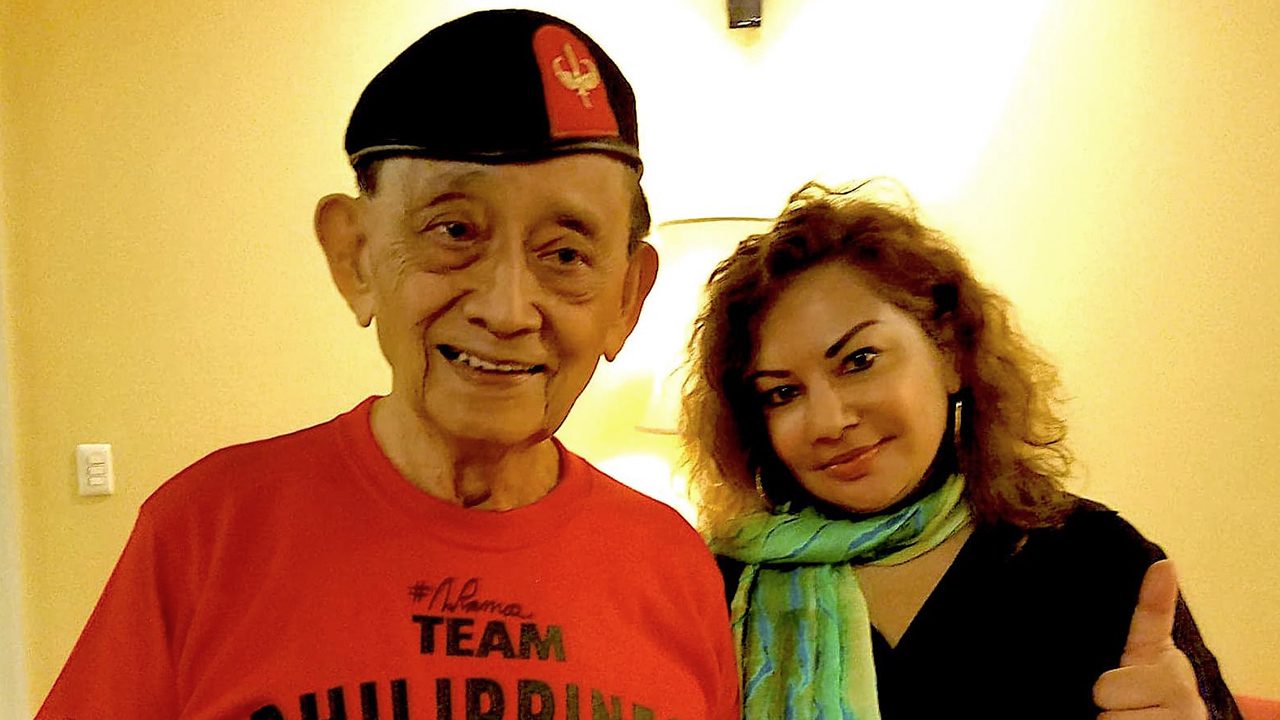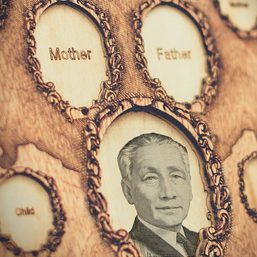SUMMARY
This is AI generated summarization, which may have errors. For context, always refer to the full article.

My Uncle Eddie (the late former president Fidel V. Ramos or FVR) was the only father figure I have ever known. My own father, the writer Ranjee G. Shahani, died when I was just a year and ten months old. At the time, he was a professor of literature and my mother, the late senator Leticia “Letty” R. Shahani – my Uncle Eddie’s sister – was working at the United Nations in New York.
Once dad died, mom went back to the Philippines with three kids in tow – my two brothers, Ranjit and Chanda, and me. My lolo (former foreign affairs secretary and ex-congressman Narciso Ramos) and lola (Angela “Ilang” Valdez Ramos) were doting grandparents. But mom, like her father before her, was too busy with her work at the Department of Foreign Affairs to pay close attention to her children. She faced even more challenges because she was both a woman and a single mother struggling to survive in official life.
So my Lola Ilang graciously picked up the slack from the get-go, offering to take care of the three of us. Lola was the glue that kept us all together, often inviting the families of their three children – Eddie, Letty and their sister Glory – to their home in Bel-Air, Makati, where the Shahanis have been living since.
Mentoring the Shahani kids
When lola died in 1976, all that changed. Lolo was too old to organize anything, and mom and Uncle Eddie were both extraordinarily busy with their respective careers. But Uncle Ed did whatever he could to mentor the Shahani children. I vividly remember how he would take us to Polo Club and teach us how to swim while wearing his glasses in the water tied around his head with rubber bands. Like his father, Uncle Ed had the classically large Ramos ears and, like all of us, poor eyesight. He would take us on trips all over the country, often when he went scuba-diving with my cousins Tet and Jo.
Once, I was thrilled when he invited me to enter the cockpit of an army helicopter and watch as the pilot navigated the plane. As a little girl, I learned to swim in Camp Crame, got far too many teeth pulled out by the orthodontists in Camp Aguinaldo, and failed my target shooting classes miserably. But Uncle Ed was always lots of fun, and would often ask his wife, our Auntie Ming, to organize lunches and dinners so the cousins could all sit down and share a meal together.
The higher up he went in his military career, the busier he got. He was often away on the weekends “maintaining peace and order,” according to my Lola, who would always speak about him in hushed tones. He would regularly visit my lolo in our Bel-Air home, where they would sip cognac and smoke a cigar while discussing pressing matters of the day. Naturally, it was a man’s world in which mom wasn’t invited and around which Lola could only worriedly fuss and hover. Indeed, to say that women in the family were not always taken seriously would be a colossal understatement.
Mom’s independent concerns (human rights, women, social development, culture and the arts) were always seen as “soft,” while his were a matter of “great consequence.” For her part, mom often saw these views as being intellectually short-sighted. It comes as no surprise, then, that, despite their deep love for one another, a sibling rivalry lingered between them until she died. Equally unsurprising is the fact that he preferred to surround himself with people who never questioned his views and simply facilitated their immediate implementation.

Gifted engineer
But there is little doubt in my mind that Uncle Ed was brilliant. I remember another time when I was much older, sitting on a plane with him while he laid out a map of the Philippines on a table. For the better part of an hour, he patiently explained where every bridge, dam and irrigation system in the Philippines was. Another time, while I was working for the United Nations, he asked me where and how New Yorkers disposed of their waste. Was it still Staten Island, he asked? I thought: heck if I know, uncle Ed! He was a gifted engineer, after all.
He may have been a better military man than a politician. After all, politics is messy, often requiring one to sell oneself to the lowest common denominator. That said, he was still an outstanding salesman for the country, garnering $20 billion in foreign investments during his term alone. Besides his significant role in EDSA 1, his other achievements – in economic development, electricity, monopoly deregulation, private enterprises, trade, poverty alleviation and reproductive health – were equally critical.
He also brokered peace agreements with the MNLF and the CPP-NPA, bringing them to the table through consultation and consensus. Thousands of prisoners were given amnesty and a few warlords taken down. Finally, even before he became President, he could have easily taken advantage of the numerous coups d’état that former President Cory Aquino was unceremoniously subjected to: he never did. Always and throughout, uncle Eddie was a Constitutionalist.
His scar
Was it enough? Perhaps not. But what can a human being and his team dismantle in mere six years and how much return on investment can a public realistically expect? Perhaps, as the scholar Al Macoy has suggested, he could also have dismantled the entire security apparatus of which he had been an integral part. But he was not only a part of Marcos Sr.’s early coterie (like the Rolex 12): how can one expect anything else of someone who had been steeped in the values of the US empire at West Point, its strident anti-communism during the Cold War and its later forays into the Middle East in the aftermath of 9/11?
As he once told us, the scar on his upper left lip was made by the bayonet of a Chinese communist soldier with whom he had fought in combat during the Korean War. I also remember how sad he once was when recounting how so many of his West Point classmates had died in that self-same war. So the anti-Huk and anti-Communist sentiments of his early years, in my view, were simply a logical consequence of that ideological line.
In 2009, I wrote him an open letter where I broached, not for the first time, the question of human rights. I was particularly concerned about the 5th Constabulary Security Unit in Camp Crame, where numerous torture victims had been detained. His silence at the time was deafening. Instead, he would show clemency towards the military personnel who had been part of the complex system of torture during Martial Law. If anti-communist and anti-Muslim vigilante groups had been encouraged during his predecessor’s term, his administration was characterized by a constant focus on efficiency and unity. This often meant that perpetrators of human rights violations were simply slapped on the wrist and reabsorbed elsewhere into the bureaucratic fold, arguably compounding the problem of impunity even further.
Still, as I have said elsewhere, I have since had lengthy conversations with former detainees and massacre survivors in Mindanao, some of whom I am honored to call friends. The general sense I have gotten is that, as chief of the now-defunct Philippine Constabulary under Marcos Sr., FVR had an idea about what was happening under his watch, but he did not directly order – let alone orchestrate – torture sessions, unlike General Fabian Ver, Marcos’ chief henchman. For this reason, several detainees have described my uncle to me as having treated them with far more decency (“mas matino”). This was eventually corroborated by official documents in the human rights class action suit against Marcos Sr. in Hawaii, where Ver is explicitly named, among others.
Privately, I also asked FVR about the PEA-Amari deal and his status as a defense advisor of the US-based Carlyle Group (along with President George Bush Sr. and others), a multinational private equity fund that deals with (among other things) military and defense contractors countering insurgencies all over the world, including the Philippines. I never got a straight answer, but I could tell that he had begrudgingly begun to give me intellectual credit for my repeated questions.
No to dynasties
All that said, many continue to describe FVR as one of the best presidents the Philippines has ever had, and I agree. One of the things he was committed to ending, and rightly so, was political dynasties. However, this vision, as we have all seen, has yet to materialize. It has also had an unfortunate effect on his family relationships, especially the women. For example, he often discouraged his immediate family from running for public office, beginning with my mother. What this has meant, sadly, is that there are few members of the Ramos clan willing to run for public office, despite the fact that some are highly qualified.
Once out of office, he often became critical of his successors for a number of reasons. But later in life, as his short-term memory slowly began to fade, he would remember his own childhood in precise detail. As soon as he saw me, he would say: “Your Mama was the brain in the family.” I remember thinking: how I wish you had told her that when she was alive, Uncle Ed!
In his twilight years, as life became slower, his sweetness returned and he was always making people laugh. I’m reminded of a 1951 letter he once wrote from the jungles of Cavite to amuse my mom, who was traveling around Europe at the time: “I have endeavored to keep alive the dying embers of my finer sensibilities, that is, the little that I used to have. Music, literature and the social graces have long been neglected – although I do try to remember to carry a copy of Shakespeare’s tragedies in my jungle backpack whenever we go up into the hills.”
Such bittersweet but fond memories – so much pride and honor, sadness and love. RIP, dear heart. – Rappler.com
Lila Ramos Shahani is an expert member of the International Council on Monuments and Sites, where she specializes in the interpretation and presentation of history and intangible cultural heritage. Her last position in the Philippine government was as secretary-general of the Philippine National Commission for UNESCO. She has several forthcoming publications on heritage and human rights in the Philippines and Southeast Asia.
Add a comment
How does this make you feel?
![[Free to disagree] How to be a cult leader or a demagogue president](https://www.rappler.com/tachyon/2024/04/TL-free-to-disagree.jpg?resize=257%2C257&crop_strategy=attention)
![[OPINION] Can Marcos survive a voters’ revolt in 2025?](https://www.rappler.com/tachyon/2024/04/tl-voters-revolt-04042024.jpg?resize=257%2C257&crop=251px%2C0px%2C720px%2C720px)
![[Edgewise] Quo vadis, Quiboloy?](https://www.rappler.com/tachyon/2024/03/quo-vadis-quiboloy-march-21-2024.jpg?resize=257%2C257&crop_strategy=attention)

![[OPINION] Sara Duterte: Will she do a Binay or a Robredo?](https://www.rappler.com/tachyon/2024/03/tl-sara-duterte-will-do-binay-or-robredo-March-15-2024.jpg?resize=257%2C257&crop_strategy=attention)



![[EDITORIAL] Marcos, bakit mo kasama ang buong barangay sa Davos?](https://www.rappler.com/tachyon/2023/01/animated-marcos-davos-world-economic-forum-carousel.jpg?resize=257%2C257&crop_strategy=attention)

There are no comments yet. Add your comment to start the conversation.